CHINESE ATHLETES AT THE 2008 OLYMPICS
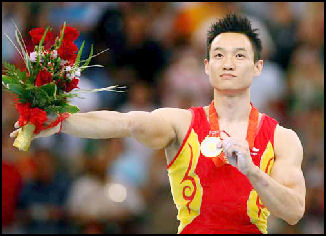
Gymnast Wang Wei chocked before
but won gold in Beijing China had a 639-athlete delegation, China’s largest ever and the largest in the 2008 Games. One reason it was so big was because as the host China was allowed to enter all the team sports, even ones like baseball and field hockey that only a handful of Chinese play in China and because many Chinese athletes didn’t have qualify for events that athletes from other country’s did.
Among those defeated in the 10-meter air rifle, the first gold medal in the 2008 Olympics, was Du Li, the Chinese favorite and the winner of the gold medal in the event in Athens in 2004. Du Li was expected to win in 2008. After placing fifth she cried and cried, saying, “I tried very hard. But I didn’t achieve it.” Internet chatter didn’t show much sympathy. An entry on one Chinese bulletin board read, “The state spent so much money on you, provided you with such good facilities, gave you four years to train...You disappoint your countrymen.” Du later won gold in the 50-meter three-position rifle. Less than hour after the 10-meter rifle was finished China won its first gold medal when Chen Xiexie won the 48-kilogram women’s weightlifting title.
Even though China topped the gold medal table at the Beijing Olympics the Chinese sports chief has called on athletes to make greater sacrifices in the run-up to 2012.
Preparations for 2008 Olympics by Chinese Athletes
For Chinese athletes, a premium was put on youth in the years running up to the 2008 Olympics. At the Olympics in 2004, if there were two athletes of relatively equal ability the younger one was chosen so that he or she could be nurtured for the 2008 Olympics. This was even the case with Olympic champions. In table tennis, a defending gold medalist was left off the team to make way for an up and coming 21-year-old prospect. The same was true with the inclusion of a 14-year-old diver on the team.
An effort was made to expand the range of sports that China performed well in. At the Olympics in 2004, Chinese athletes dominated sports like table tennis, badminton, shooting, diving and women’s weightlifting as they had in recent years but also had success in sports that they had traditionally not been as good at such as judo, tennis and sailing. The strategy worked to some degree. While maintaining their traditional dominance in diving, gymnastics, table tennis and badminton, Chinese athletes also scored gold medals in women's weightlifting, archery, shooting and other sports. Chinese athletes competed in 26 of 28 sports and even won a gold medal in the 500 meter two-man canoeing event.
US Olympic Committee chairman Peter Ueberroth has said that the Americans must learn from the Chinese example, “China has been systematically targeting every single available medal, and we're going to have to do that in the future. The resources that they put toward their Olympic team and the population base and the dedication is fantastic. It's much more difficult for the rest of the world to compete, but that's the way it should be.”
An efforts was also made to get the best coaches from around the world. Del Harris, a former NBA coach, was tapped to coach the men’s national basketball team. It has also invested heavily in sports that give out lots of medals and have relatively light competition such as judo, weightlifting and shooting.
Olympic historian David Wallechinsky predicts that China would win the medal count for the first time in its history. He told the Washington Post, “You will see them achieving success across the broad, except for track and swimming, which are all really difficult sports to break through in.” China aimed to prove him wrong on the last point. In the 1990s China launched Project 119 to improve its performance in swimming, aquatics and track and field, which account for 119 of the 310 gold medals.
For the most part Chinese athletes were restricted from talking to the media to minimize their distractions and keep them focused on their training. Foreign journalists in search of interviews had to navigate through the tangled bureaucracy and inevitably had their requests turned down. Chinese athletes were more accessible when they were outside China.
Chinese Medal Count at the 2008 Olympics
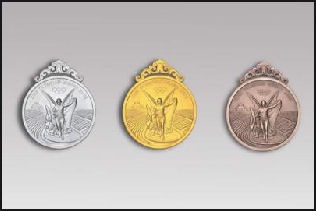
China won 51 gold medals, 15 more than the United States and 19 more than it won in Athens in 2004. It was the highest tally of any nation since the Soviet Union won 55 in Seoul in 1988 and the first time in 72 years the gold medal standings was topped by a country other than the United States or the Soviet Union/Russia (the last time was by Germany in 1936).
The United States won the most medals, 110, 26 more than it won in Athens in 2004. China was second with an even 100 medals. As much as the games showed the dominance of these two sports powerhouses it also showed that there was plenty of talent to go around: athletes from 55 countries won gold medals and 87 nations won medals, including first timers Togo and Mauritius.
Overall China won 51 gold, 21 silver and 28 bronze for a total of 100 medals. The United States won 36 gold, 38 silver and 36 bronze for a total of 110 medals. Third place Russia won 23 gold, 21 silver and 28 bronze for a total of 72 medals
The Chinese media was obsessed with the medal count. Television and radio shows provided regular updates and new medals were treated like breaking news. The Chinese were able to win the gold medal count despite not wining a single event in track and field, which awards more medals than any other sport, and having some sub-par performances by some its star athletes.
Actually, if you rank a nation's sporting prowess by how many Olympic gold medals it wins per capita, China, with a population of 1.3 billion, ranks 47th, and the US, with 305 million people, 33rd. In terms of medals per capita China was 68th with one medal per 13,218,519 people compared the 45th place for United States with one medal per 2,737,636 people and first place for the Bahamas with one medal per 158,828 people. In terms of medals per area China was 55th with one medal per 37,054 square miles compared to 53rd place for the United States with one medal per 33,798 square miles and first place for Bahrain with one medal per 257 square miles,
Xu Pei, a professor of sports psychology in Wuhan told the Washington Post, “To win more medals is a showcase of a powerful nation. It represents the state of the Chinese people: that Chinese people are not the [so-called] “sick Asian men” anymore. It boosts a sense of national pride.”
Chinese Medals at the 2008 Olympics
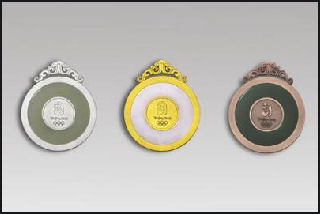
The Chinese but great emphasis on winning gold. Many Chinese athletes who had to settle for silver or bronze seemed dejected. On the stress of trying to win the gold medal, table tennis player Wang Nan, who won a gold in Athens in 2004 but settled for silver at Beijing, said, “In the end, there wasn’t much reason for me to smile because the pressure of being gold medalist is huge.”
The Chinese won medals in 21 of the Olympics’ 38 sports, including first time gold medals in archery, rowing, sailing, boxing and trampoline and its first Olympic medals in beach volleyball, synchronized swimming, rhythmic gymnastics, and field hockey. Foreign coaches were credited with helping Chinese athletes, especially in swimming, synchronized swimming and fencing, but Chinese coaches also helped other countries, such as women’s gymnastics and women’s volleyball for the United States.
Chinese athletes won most of the gold medals in sports it had dominated for years: weightlifting, shooting, gymnastics, table tennis, badminton. Chen Xiexia won China’s first gold medal, in the 48-kilogram division of women’s weightlifting. Chinese super heavyweight boxer Zhang Zhilei won China’s 100th and final medal. Project 119 was considered something of a disappointment. China won just four gold medals in the main sports targeted: one in swimming, one in sailing, one in canoeing and one in rowing.
China's 63 gold medalists were given a tax-free bonus of $51,000, about $22,000 more than was given to gold medalists in 2004, plus a kilogram of gold, various perks and possibly a lifetime pension that made the total haul worth $80,000 to $150,000. In 1984, the first modern Olympics in which China took part, gold medalist received bonuses of less than $900 each. The United States gives $25,000 for each gold medal.
Some Chinese athletes are expected to earn considerably more when endorsements and other earnings are factored in, Chen Xiexia, the 48-kilogram weightlifter who won China’s first gold medal, is expected to make between $700,000 and $1.4 million.
Chinese Athletes at the 2008 Olympics
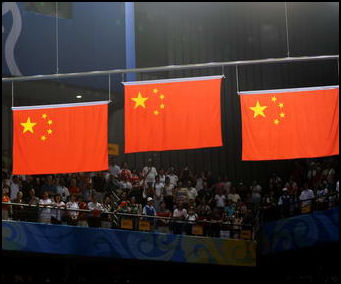
sweep in women's table tennis Only those who won gold got the full red carpet. According to a well known saying, “There is no first place for literature, there is no second place for kung fu.” Chinese athletes tended to be modest and refrain from boasting when they won and were critical of their performances if they lost, with some being hypercritical even when they won silver or bronze medals.
The Chinese sports journalist Xhao Mu wrote in his blog, “The problem with Chinese athletes is they are not bold enough, they don’t have strong personalities to show. Instead they’re just symbols of national honor to be shown to the public.”
Most of the athletes competed without family members present. There were no celebrations with parents after winning medals, only with coaches. Most athletes were kept on a tight leash even after their competition. Their exposure in the media was limited. The foreign press was unable to interview them before and during the Games. There were no reports of them partying or enjoying themselves. No one was allowed to go home until after the Closing Ceremonies.
Many thought that China’s strong performance is the just the start of it becoming the world’s predominate sports superpower. Others were not so sure . Eed Hulam editor of the Olympic website “Around the Rings” said, “I think this puts them over the hump. They’re thinking if they keep developing athletes they’ll get even better...but it’s not clear to me what they’ll be like in London. They’ll have to qualify for event; they won’t have the hometown advantage and the same incentive. They are still weak in a lot of areas that are difficult to predict.”
Pressure on Chinese Olympics Athletes
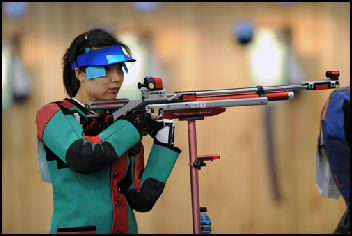
shooter du li lost, cried
and came back to win gold The pressure on athletes and a sense of duty to China were very great. Mao Zhixiong, a sports psychologist at Beijing Sports University told the Washington Post, “Our athletes have more pressure than other countries’ athletes. They feel they are really responsible for the country’s image. Many Chinese athletes practice their sports not because the like it but because they are selected by the country.”
One of the biggest problems that Chinese athletes face is pre-competition nervousness called the “You’ll disappoint 1.3 billion people’ syndrome. Wang Jin, an expert on “choking” at Zhejiang University, told the Washington Post, China has imposed “the hopes of a whole society upon athletes.” As a result of the pressure “our athletes are often more psychologically fragile than foreign athletes.”
For many Chinese it seems that the Olympics — especially the one in Beijing — are the only sporting events that matter. Li Na, the first Chinese tennis player to crack the top 30 in women’s pro rankings, “If you only win Wimbledon, you are famous in the world, but in China, they would say, “Oh well, its not the Olympic Games. In China, it is only important to win the gold in the Olympics. If you finish second, or finish last, it’s the same.”
Chinese gymnastics coach Huang Yubin told the New York Times, “We have the home support, which will be fantastic, but the expectation is also high, maybe too high for us. You can imagine the pressure when 1.3 billion people are watching you.”
Chinese fencing coach Wang Jian told the Washington Post, “Athletes have more pressure competing on the home field. No matter how good an athlete you are, you are inevitably faced with huge psychological pressure competing under these circumstances, Inevitably you make mistakes. Many Chinese expected China to win five gold medals in fencing and regarded the team’s performance that fell short of that goal as a failure
Advertisements before the Games scolded fans who put too much pressure on athletes and emphasized gold medals too much.
Preparations by Chinese Athletes for the 2008 Olympics
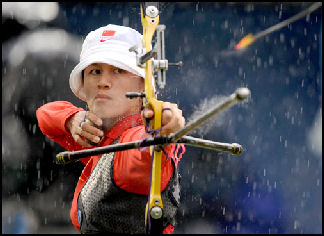
Zhang Juan Juan
surprise archery winner A lot of time, effort and expense went into mentally training athletes, especially in sports like diving, shooting and gymnastics where keeping cool, relaxed and focused were important. Sports psychologists were brought it; tips were given; downloadable advise was offered on the Internet. Specific strategies were developed for individual sports; soothing music for gymnasts; yoga and Confucian philosophy for divers. Hypnosis, insomnia prevention, “Somato-sensory music regulation, vibrating beds, uplifting stories and films such as “Forest Gump” were all used.
Zhang Lwei, a sports psychologist at Beijing Sport University, told the Washington Post he tried to take advantage of the “overrated social expectations of athletes.” We “order them to say positive things every morning when they awake and every night before they fall asleep... “Tomorrow is another day” or “I can call my mother again to tomorrow” are the ones I often use.” Jin Wang, a Chinese-born American sports psychologist consulted by the Chinese Olympics Committee, said he got his athlete to envision a table with 20 legs, not just four, and got them to associate each table with a personal strength such as quick reaction time and the affection of many supporters.
The decision to invest in psychological training came in part as a result of the dismal performance in 2004 by the men’s gymnastic team, who appeared to come unraveled and choked. Defending world champions and strong favorites, they made a number of egregious mistakes: one slipped on the parallel bars, another fell on the high bar and two stepped out of bounds on the floor exercise.
In training centers posters exhort athletes with slogans like “The Motherland is Above Everything; Strike for Gold in the Olympics” and “Pressure each other, pressure yourself...There will be no champion of one does not go through the ultimate pressure.”
As training for the Olympics and to see how their athletes would performed under pressure, the Chinese conducted an experimenting in which the parents of gymnasts were invited to watch their children perform. One sports official said, “During the competition, some athletes didn’t feel very well and even fell down from the balance beam. They were affected negatively.”
Sympathy for Chinese Athletes at the 2008 Olympics
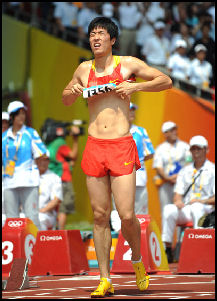
track star Liu Xiang withdraws Questions were also raised about the pressure put on Chinese athletes and the shame they felt when they didn’t win gold medals. By the end of the Olympics even Chinese officials began having concerns. One Chinese official said, “Today, we have too many things to show the world. China no longer needs the number of gold medals to prove itself. In the last days of competition, the greatest harvest for China is not the position on the top of the gold medal list, but the growing psychological maturity of the people.”
The People’s Daily said that “losers need more warm support from the society and from all walks of life. A little bit of your encouragement and attention will help them out of the shadow of failure, warm them up, inspire them and make them feel more confident.”
Image Sources:
Text Sources: New York Times, Washington Post, Los Angeles Times, Times of London, National Geographic, The New Yorker, Time, Newsweek, Reuters, AP, Lonely Planet Guides, Compton’s Encyclopedia and various books and other publications.
Last updated April 2010
